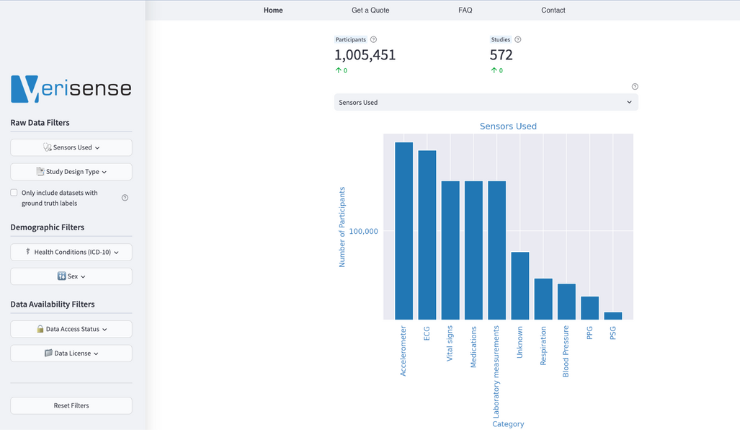Verisense Health has announced the launch of its Verisense Digital Biobank featuring digital health data from more than one million people, representing healthy populations and specific diseases.
Currently, the Verisense Digital Biobank includes data from more than 570 studies from both third party and Verisense Health research. More than one million people are represented in the Verisense Digital Biobank as of August 2024, and that figure is expected to reach two million by the end of the year says the company.
The Digital Biobank includes measurements from blood pressure, heart rate, skin temperature, respiration, accelerometry, polysomnography (PSG), electrocardiogram, electroencephalogram, electromyography, electrooculography, photoplethysmography and galvanic skin response sensors. This data can be used to identify and validate algorithms and digital biomarkers, establish norms and thresholds for specific diseases, compare different algorithms on the same data, and provide and/or augment data for regulatory filings.
“For too long, digital health data from thousands of studies from around the world have been virtually impossible to access,” said Verisense Health CEO Geoff Gill. “As a result, researchers have had to collect the same or similar data over and over at great cost in time and money. Our goal is for researchers never to have to collect the same data twice.”
The Verisense Digital Biobank leverages an AI-powered Dataset Cataloger, which extracts and catalogs relevant metadata from open-source digital health datasets. Verisense says this tool largely automates the process, enabling Verisense Health to update the Verisense Digital Biobank frequently.
Verisense Health is already conducting research using the Digital Biobank. One project is comparing two different open-source analytics packages that use accelerometer data to assess sleep. These packages are being compared to determine whether they are equivalent and evaluated against PSG data to assess their accuracy.
Verisense Health is also using the Digital Biobank to establish norms for activity and sleep metrics drawing from a population of more than 20,000 participants in longitudinal studies and more than 320,000 people in other types of study. According to Verisense, the large population will allow it to establish norms to match the demographics of the populations of interest for value-based medicine and clinical trials.
Verisense Health says it has contributed sample data to and is working with the CDISC Digital Health Technologies team to help develop data interchange standards for digital health data. The Verisense Digital Biobank will be conformed to meet those new standards once they are introduced.









